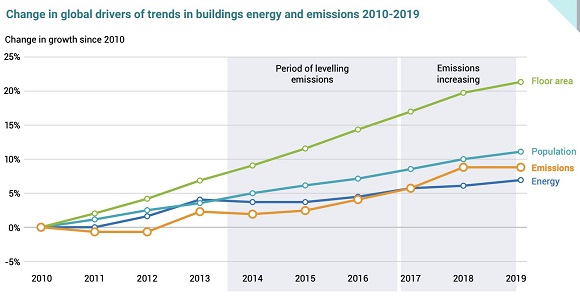 Saturday, May 18, 2024
Saturday, May 18, 2024  Saturday, May 18, 2024
Saturday, May 18, 2024 
Emissions from the operation of buildings hit their highest-ever level in 2019, moving the sector further away from fulfilling its huge potential to slow climate change and contribute significantly to the goals of the Paris Agreement, according to a new report released today.
However, pandemic recovery packages provide an opportunity to push deep building renovation and performance standards for newly constructed buildings, and rapidly cut emissions. The forthcoming updating of climate pledges under the Paris Agreement—known as nationally determined contributions or NDCs—also offer an opportunity to sharpen existing measures and include new commitments on the buildings and construction sector.
The 2020 Global Status Report for Buildings and Construction, from the Global Alliance for Buildings and Construction (GlobalABC), found that while global building energy consumption remained steady year-on-year, energy-related CO2 emissions increased to 9.95 GtCO2 in 2019. This increase was due to a shift away from the direct use of coal, oil and traditional biomass towards electricity, which had a higher carbon content due to the high proportion of fossil fuels used in generation.
When adding emissions from the building construction industry on top of operational emissions, the sector accounted for 38 percent of total global energy-related CO2 emissions.
“Rising emissions in the buildings and construction sector emphasize the urgent need for a triple strategy to aggressively reduce energy demand in the built environment, decarbonize the power sector and implement materials strategies that reduce lifecycle carbon emissions,” said Inger Andersen, Executive Director of the UN Environment Programme (UNEP).